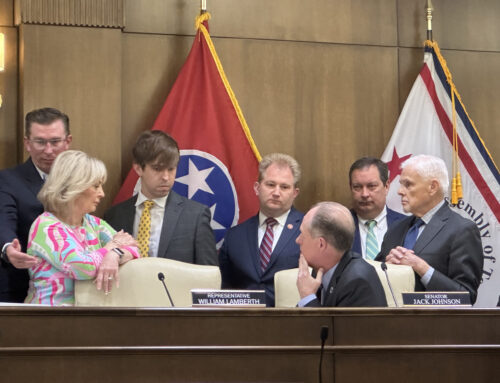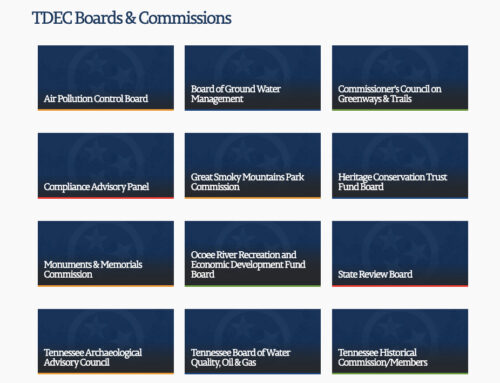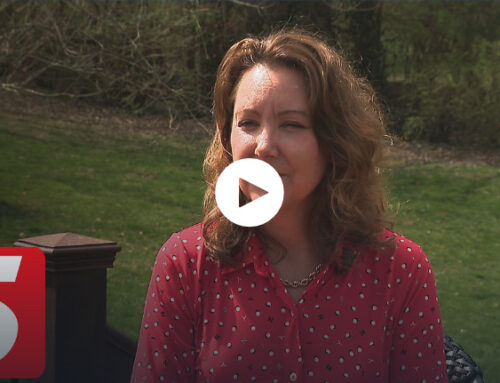
NewsChannel5 Reporter Phil Williams interviews House lawmaker Scotty Campbell. Campbell was found to violate the House sexual harassment policy after a complaint by a 19-year-old legislative intern. A judge ruled Tuesday that expense records to house and relocate the intern are confidential. NewsChannel 5 has reported that at least $8,800 was spent to house and relocate the intern.
Davidson County Chancellor Russell T. Perkins ruled Tuesday that expenses related to handling the sexual harassment of a 19-year-old legislative intern by a state lawmaker are exempt from the public records law.
Perkins said that a House rule and workplace harassment policy exempted the expense records from disclosure. However, the judge rejected the state’s argument that the public records law does not apply to the General Assembly.
“Although the Court gives some weight to the persuasive authority of Mayhew v. Wilder… and its holding that the Open Meetings Act does not apply to the Tennessee General Assembly, this Court is reluctant to make such a sweeping ruling in the context of the Public Records Act. The Court is not aware of any Tennessee appellate court decision which has adopted this position. The broad language of the Public Records Act does not indicate that the legislature is exempt from by its provisions,” wrote Perkins in his ruling in Manookian v. Office of Legislative Administration and Connie Ridley.
Ridley is director of the Legislative Administration for the General Assembly. In Mayhew v. Wilder, the Court of Appeal ruled in 2001 that the legislature is not subject to the open meetings law.
State paid to house, move intern after sexual harassment
Attorney Brian Manookian requested records for hotel and moving costs related to the scandal involving state Rep. Scotty Campbell, R-Mountain City. Campbell resigned in April 2023 after a House ethics subcommittee found he had violated the House’s workplace discrimination and harassment policy.
NewsChannel5 reported in May 2023 that the scandal involving Campbell cost taxpayers at least $8,841, partly based on the intern’s own account revealed in an email as well as receipts. Some of the money was spent to put the intern in a hotel for 22 days at a cost of $5,411 and part was for moving furniture from the intern’s apartment back to her home. It is not clear who authorized the expenditures and whether more was spent, according to the NewsChannel5 report.
“Although I am incredibly grateful, it feels as if they are trying to buy my silence,” the intern wrote in an email sent to her university and obtained by NewsChannel 5. “After coming forward, I was implored by director Ridley not to communicate about the instances with anyone.”
State argues General Assembly is exempt from public records law
After the state denied Manookian’s request for expense records, Manookian filed a lawsuit arguing that they should be released under the public records law. The state claimed, in part, that the public records law does not apply to the General Assembly.
The state also argued that a House rule and a policy governing investigations of workplace harassment by lawmakers allowed the state to withhold the expense records and that access to the records would violate “the separation of powers, the political question doctrine, and the doctrine of legislative immunity.”
Perkins rejected that the General Assembly is exempt from the public records law, but found that the House rule and the policy served as exemptions to the records sought by Manookian.
House Rule 82 allows an ethics subcommittee to review complaints of workplace discrimination and harassment by lawmakers in closed meetings. The rule also stipulates: “In accordance with the policy, confidentiality of the parties involved shall be maintained to the greatest extent possible.”
The House’s workplace discrimination and harassment policy also has a confidentiality clause that goes further: “No information concerning a complaint will be released to anyone not directly involved in an investigation, a lawsuit, the implementation of corrective action, or as otherwise required by law.”
Based on the rule and the policy, Perkins concluded: “All records pertaining to complaints of sexual harassment, including protective measures used for legislative employees are confidential…”
Perkins declined to reach the arguments about the separation of powers, the political question doctrine and legislative immunity, saying he decided the case on other grounds.
The House Workplace Discrimination and Harassment Subcommittee that handled the Campbell complaint included Shelbyville Republican Pat March, Franklin Republican Sam Whitson, Memphis Democrat Karen Camper and Nashville Democrat Bill Beck. (Beck died in June later the same year.)




